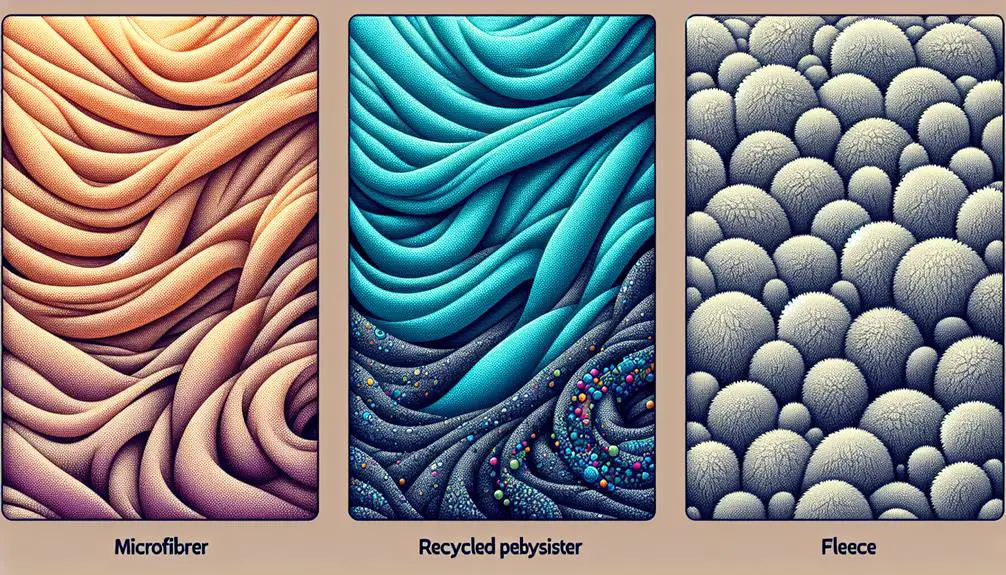I know three types of polyester: PET polyester, known for durability and derived from petroleum; Plant-Based polyester, made from renewable sources and biodegradable; and PCDT polyester, with exceptional elasticity and strength, ideal for rugged products. Each type offers unique benefits and properties worth exploring further.
Key Takeaways
- PET Polyester is durable, derived from petroleum, and recyclable.
- Plant-Based Polyester is sustainable, biodegradable, and reduces reliance on fossil fuels.
- PCDT Polyester offers exceptional elasticity, durability, and resistance to abrasion.
- PET Polyester is versatile, used in textiles, automotive, and packaging.
- Plant-Based Polyester is eco-friendly, with properties similar to traditional polyester.
PET Polyester
PET Polyester, known for its durability and versatility, is the most common type of polyester used in various industries. This synthetic fabric, derived from petroleum, is produced through a specific production process that involves polymerization of ethylene glycol and terephthalic acid. The resulting PET polyester showcases excellent durability, strength, and resistance to moisture and chemicals, making it a preferred choice in textile manufacturing, automotive applications, and packaging materials.
One of the notable features of PET polyester is its recyclability, allowing for a more sustainable production cycle. This polyester can also be blended with natural fibers or other synthetic fabrics to create materials with enhanced properties. Such blending of fibers not only improves the overall characteristics of the fabric but also expands its range of applications. From clothing to home furnishings and industrial use, PET polyester's versatility and durability make it a staple in a wide array of products across different sectors.
Plant-Based Polyester
Derived from renewable plant sources like sugarcane or corn, plant-based polyester, also known as bio-polyester, is a sustainable alternative to traditional petroleum-based polyester. This eco-friendly material reduces dependence on fossil fuels, offering similar properties and performance to conventional polyester while lessening environmental impact.
Bio-polyester's biodegradability under specific conditions further distinguishes it from non-biodegradable polyester, contributing to a reduced carbon footprint. As consumer awareness and demand for sustainable products increase, companies are embracing plant-based polyester in their offerings.
The shift towards utilizing renewable sources for polyester production aligns with the global push for eco-conscious practices. By opting for plant-based polyester, we support the move to greener alternatives and promote a more environmentally friendly industry.
The versatility, performance, and reduced environmental impact of bio-polyester make it a compelling choice in meeting the growing consumer demand for sustainable materials.
PCDT Polyester
Known for its exceptional elasticity and durability, PCDT Polyester is a versatile material suited for heavy-duty applications. Here are three key points about PCDT Polyester:
- Outstanding Resistance: PCDT Polyester showcases excellent resistance to abrasion and chemical exposure, ensuring longevity and exceptional performance in challenging environments.
- Versatile Applications: Widely used in industrial ropes, outdoor gear, and heavy-duty fabrics, PCDT Polyester's robust properties make it a preferred choice for a variety of demanding applications.
- Superior Strength and Resilience: Compared to other polyester types, PCDT Polyester offers unmatched strength and resilience. Its ability to maintain shape and structure under high-stress conditions makes it ideal for creating rugged and long-lasting products.
Frequently Asked Questions
What Are the 3 Grades of Polyester?
I'll explain the 3 grades of polyester. PET is common and durable, used in fabrics and bottles. PCDT is elastic and tough, for heavy-duty items. Plant-based polyesters are eco-friendly alternatives, made from renewable sources. Each type has unique qualities for specific uses.
What Are the Different Types of Polyester?
Polyester encompasses various types with unique qualities. From PET's durability to plant-based sustainability and PCDT's elasticity, each serves specific purposes. These options cater to diverse needs in industries like fashion, home goods, and heavy-duty applications.
What Are Three Polyester Examples?
Polyester examples vary widely, from PET for bottles to PCDT for durable fabrics and plant-based options for sustainability. Each type offers distinct properties suitable for diverse applications, showcasing polyester's versatility in different industries.
What Are the Most Common Polyesters?
The most common polyesters include Polyethylene Terephthalate (PET), Polybutylene Terephthalate (PBT), and Polycyclohexylenedimethylene Terephthalate (PCT). Each offers unique properties suited for various applications, with PET being widely used in bottles, fabrics, and packaging.

